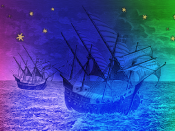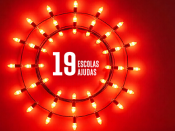Por André Moitinho (FCUL, CENTRA).
Most stars form in groups, a result of the gravitational collapse and fragmentation of cold giant molecular clouds. These groups eventually disperse and contribute to the smooth distribution of stars in their host galaxies. Theoretical and numerical studies, indicate that the transition is driven by a range of internal factors, such as stellar evolution, distributions of stellar masses and velocities, as well as external elements such as galactic tidal forces, and interactions with giant molecular clouds and spiral arms. Yet, robust observational evidence to back these theories is sparse.
In this seminar, I present the findings of my research team on the dispersal of star clusters and how it affects the structure and development of the Milky Way. The discussion is organized into four parts:
- Internal Dynamics of Star Clusters: This section presents observational maps of the internal kinematics of star clusters. Evidence of cluster rotation and expansion/contraction is discussed.
- The Cluster Dissolution Process: Presents the observational determination of the rate at which star clusters dissolve and transfer mass to the galactic field.
- Impact on Galactic Structure: The role of cluster dissolution in modifying the Milky Way's structure, particularly its contribution to the disk's thickening, will be explored.
- Navigating the Data Avalanche: The final section addresses the explosion star cluster discoveries and catalogues, primarily driven by the European Space Agency (ESA) Gaia mission. We explore the challenges of this influx of data and discuss our work for developing a coherent, research-friendly framework for the analysis of star clusters.
Short Bio: André Moitinho de Almeida is an Assistant Professor at the Physics Department of FCUL, with research interests in the structure and evolution of the Milky Way. He is also active in technology development, for which he created a Big Data Visualisation Lab, and which has produced the iconic sky maps of the Gaia mission of the European Space Agency (ESA). His interests extend to space sustainability, namely space debris and light pollution, having represented Portugal in the United Nations Committee on Outer Space, the ESO Scientific and Technical Committee, and the ESA Astronomy Working Group, among others. He was President of the Portuguese Astronomical Society for 13 years, and Chair of the Board of Directors for the Astronomy & Astrophysics journal. Currently, he is co-coordinator of the Physics BSc programme at FCUL and coordinator of the CENTRA pole at FCUL.
















